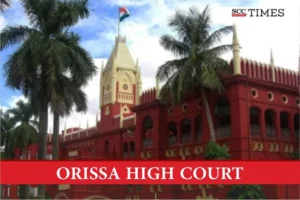Orissa High Court: In an appeal filed under Section 37 of the Arbitration and Conciliation Act, 1996 (the Act) against the judgment dated 10-04-2019 passed by the District Judge denying to set aside the Arbitral Award passed in favor of respondent-claimant, a Superclass Contractor, for constructing the Jambhira Earth Dam Reach-IV(B) under the Subarnarekha Irrigation Project in Odisha, a single-judge bench of D. Dash,* J., upheld the arbitral award and modifying the interest rate awarded by the Arbitrator from 18% to a more reasonable 9%, based on the lack of sufficient reasoning for the higher rate.
Factual Matrix
In the instant matter, the respondent-claimant, a Superclass Contractor, was awarded the contract of constructing the Jambhira Earth Dam Reach-IV(B) under the Subarnarekha Irrigation Project in Odisha, with a completion deadline of 28-11-1997 with a contract price of Rs. 2,50,68,948.00/-. Despite deviations and the Chief Engineer’s directive to complete the work by March 1997, the respondent-claimant completed the work by March 1997. However, only part payments were made, and the final bill was not settled. The respondent raised several claims, including amounts for work done, price escalation, idle charges, and interest, arbitration costs among others. The matter was referred to arbitration and the Arbitrator passed an award in favor of the respondent. The appellant-State filed an application under Section 34 of the Act to set aside the arbitral award, which was rejected by the District Judge on 10-04-2019. Aggrieved by the impugned judgment dated 10-04-2019, the appellants the present appeal under Section 37 of the Act challenging the same.
Moot Point
-
What is the scope of the High Court’s power under Section 37 of the Act and whether the arbitral award is in contravention of the fundamental policy of provision laid down in the Limitation Act, 1963?
-
Whether the findings of the Arbitrator are based on no evidence and as such the same are perverse and thus the award suffers from the vice of patent illegality?
-
Whether the Arbitrator is right in awarding the interest as afore-stated by travelling beyond the contract, which is impermissible and as such without jurisdiction?
Parties’ Contentions
The appellants contended that the claims were non-arbitrable due to non-compliance with Clause-53(F) of the agreement, which requires a security deposit for arbitration. It was contended that the claims were time-barred as per Clause-36 of the General Conditions of Contract (GCC) and the Limitation Act. The appellants argued that the Arbitrator overstepped by awarding rates for work already covered under the contract. It was further argued that the interest was not payable as per Clauses 53(C) and 53(E) of the GCC.
However, the respondent contended that the arbitral award should not be lightly interfered with, as it was not an ordinary adjudicatory order. It was contended that the claim was not barred by limitation since the dispute was ongoing and unresolved. It was asserted that the Arbitrator’s findings were based on detailed evidence and were not perverse. It was also contended that the interest was rightfully awarded as there was no express denial in the contract.
Court’s Analysis
The Court relied on McDermott International Inc. v. Burn Standard Co. Ltd., (2006) 11 SCC 181, where the Supreme Court emphasised on the limited supervisory role of the courts in testing the validity of an arbitral award and held that the courts can only confirm or set aside the award under Section 34, but they cannot modify the same and NHAI v. M. Hakeem, (2021) 9 SCC 1, where the Supreme Court reiterated that under Section 34, the power of the courts is limited to either confirming or setting aside the arbitral award, without any modification and Associate Builders v. Delhi Development Authority, (2015) 3 SCC 49, where the Supreme Court held that an arbitral award can be set aside if it suffers from patent illegality and this includes findings based on no evidence or ignoring vital evidence.
The Court stated that the Court’s power under Section 37 of the Act is limited to reviewing whether the arbitral award should be set aside under Section 34 of the Act. The Court asserted that the judicial interference is limited to cases of “patent illegality” in the arbitral process. The Court stated that the grounds for setting aside an award include patent illegality, but this must be a fundamental error affecting the root of the matter. The Court stated that the erroneous application of the law or minor errors do not constitute grounds for setting aside an Arbitral award.
The Court noted that the Arbitrator’s findings were based on the evidence and materials on record, such as the non-completion of final measurements and the appellant’s acknowledgment of pending payments. The Court held that a thorough examination of evidence by the Arbitrator justifies their findings and the same could not be termed as “perverse” or suffering from patent illegality.
Court’s Decision
The Court affirmed the findings of the Arbitrator on various claims and held that the decision was based on permissible views supported by evidence. The Court further held that the arbitral award’s interest rate of 18% per annum was disproportionate and modified it to 9% per annum. The Court disposed of the appeal with the modification of the interest rate awarded by the Arbitrator.
[Govt. of Odisha v. Jagannath Choudhury, 2024 SCC OnLine Ori 1670, order dated 20-05-2024]
*Judgment by Justice D. Dash
Advocates who appeared in this case :
Mr. S.N. Das, Additional Standing Counsel, Counsel for the Appellants
Mr. Pratik Parija, Counsel for the Respondent

